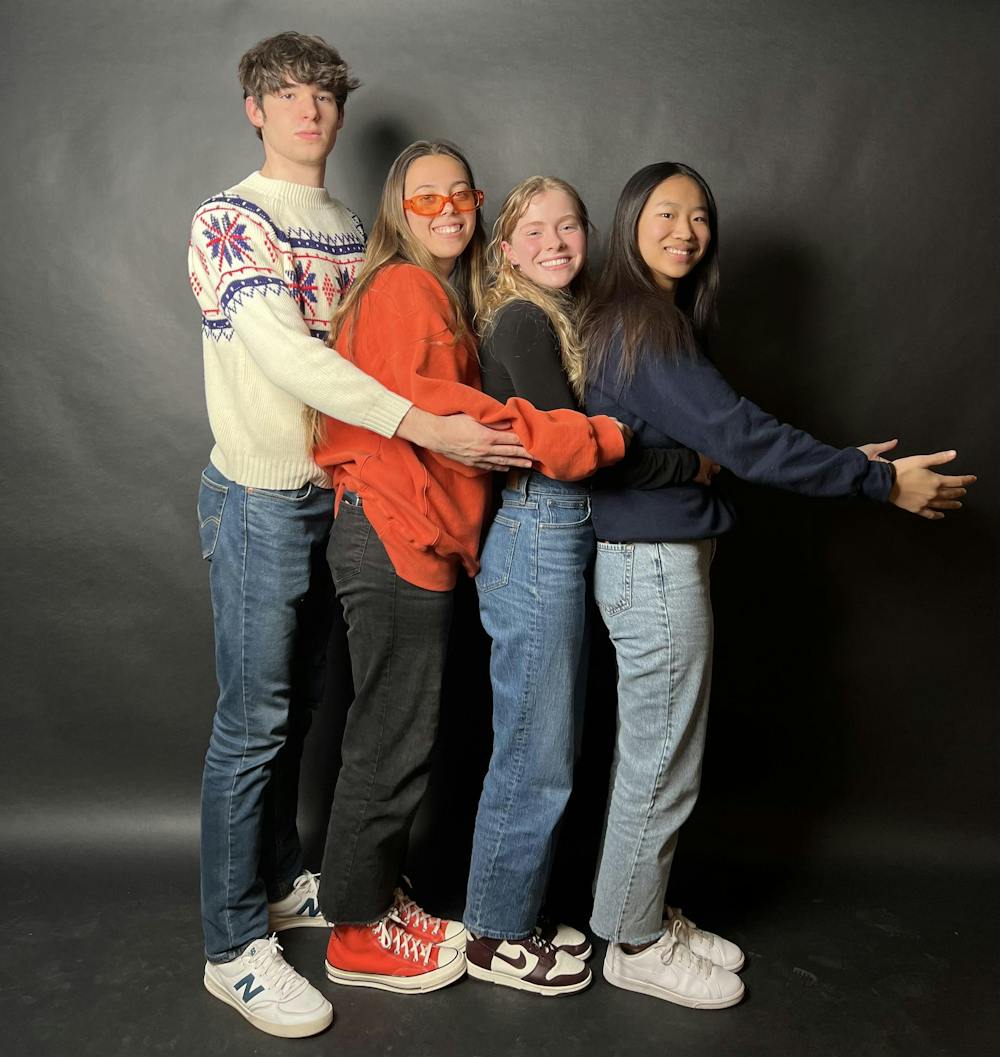In film and other media, three things are required to pass the Bechdel Test: two of the characters must be women, these women must converse with each other, and the topic of conversation must be something other than a man. Bonus points are given if the two women have names.
The Bechdel Test is typically a way to measure the representation of female characters in the media, but on Princeton’s campus, it brings to mind something a little different. Here, it’s the name of a student-run podcast hosted by Sophia Shepherd ’26, Emily Driver ’26, and Simon Marotte ’26, who settled on the title after a three hour text conversation.
Marotte, the only male in the trio, suggested it.
“We are feminists, but it’s not a feminist podcast,” said Shepherd, speaking about the naming process. “It’s because there are two women speaking to one other … and one guy. Sometimes it’s a joke that we leave the one guy out. Hence, the Bechdel Test.”
Shepherd is a former member of The Daily Princetonian’s Business Team, and Marotte is a former Head Puzzles Editor for the ‘Prince.’
Every week, the Bechdel Test invites a new guest from around campus to come on the podcast and chat about anything from computer science classes to murder mystery wedding parties. Guests have ranged from eating club leadership to Dean of the College Jill Dolan, who knew Alison Bechdel — inventor of the Bechdel Test — personally.
“The podcast was a joke,” explained Shepherd, describing the early stages of the project. Shepherd and her friend, Luke Miller ’26, would continually joke about starting a campus podcast and even promised Marotte he could be their first guest.
Eventually, it wasn’t a joke anymore.

During winter break of their first year, Shepherd set her mind to making the podcast a reality. She and Miller floated some ideas around, but he later bowed out. Shepherd pivoted, calling up Marotte.
“I was like: Simon’s hilarious, let me ask Simon,” said Shepherd. Marotte agreed and suggested turning the duo to a trio with the addition of Driver.
A FaceTime turned into a Zoom meeting, and the Bechdel Test was born.
‘The guests make it good’

In the beginning, the structure of the podcast was very up in the air. The group spent time playing with their style, humor, and format.
According to Driver, the show started with no guests and was instead structured around the trio’s own conversation.
Those episodes “will never see the light of day,” Marotte added.
“They just weren’t good,” said Shepherd. “The guests make it good.” They all agreed that it was hard to produce content with just the three of them, as it made them dependent solely on humor to keep the podcast interesting.
“A new guest every time makes it easier to talk about things … [there’s] something new to be said,” Driver added.
After those first solo recordings, they decided to bring some guests on the show. They now have an impressive list of guests drawn from many corners of campus.
“I think we learned during [our] first semester there are so many cracked and super impressive people here with incredible stories,” said Shepherd.
They also noticed that many of these impressive people on campus don’t regularly share their stories.
“You have to dig,” said Shepherd. “This podcast creates a way that you can dig. It also gives you a way to meet new people.”
They source guests in different ways, but Driver and Marotte agree Shepherd is the “mastermind” behind it all, especially when it comes to LinkedIn investigating. She uses premium status on Linkedin to look at people’s profiles in incognito mode, which helps her find new guests and create fun questions for them.
“Often [when I’m] not paying attention to class, I’m on their LinkedIn, being like ‘what’s a question I can ask?’” said Shepherd.
She then compiles the list of questions and sends them to the upcoming guest, giving them full veto power on any question they don’t want to answer.
Besides “LinkedIn stalking,” the Bechdel Test hosts also source guests through the community.
“It’s always good to ask people we know, ‘If you were listening to the podcast, who would you most want to hear on this podcast?’” noted Driver.
Through this method, they have been inspired to reach out to some of their most esteemed guests, like Dean of the College Jill Dolan. Other times, guests are discovered by word of mouth.
“Sometimes, we just hear random things,” said Driver. “Our first episode of season two was someone who voiced Boots the Monkey [Koda Gursoy ’26] for two seasons, and we just heard that through a friend of a friend.”
“It’s very interesting to talk to people in various communities on campus,” said Shepherd. “Also, that’s how you increase listenership. From a selfish standpoint, we appreciate the conversations, but it’s also good at broadening the audience.”
‘The Socratic Dialogue’
The podcast draws inspiration from various celebrity podcasts, but two in particular stand out to them. The style of the show is influenced by Smartless, a podcast in which the hosts — Jason Bateman, Will Arnett, and Sean Hayes — invite random celebrities to chat about their lives. The interview style is inspired by Zach Galifianakis’ Between Two Ferns, a talk show which features Galifianakis’ dry, sarcastic sense of humor.
However, Marotte noted that they had to rein in the sarcastic humor Galifianakis relies on in his talk show in order to make their guests more at ease.
“It didn’t really work well for our campus,” said Marotte, referencing the Between Two Ferns humor. “We wanted to make our guests more comfortable.”
This doesn’t stop the trio from having fun with their guests, however. Their pilot season was based on what they referred to as their “socratic dialogue,” a list of “absurd” questions they compiled.
These questions are evident in the early episodes of their podcast.
“Today we sit down with a narcissistic Princeton student,” joked Shepherd in the first few seconds of their first episode with Shannon Yeow ’26. “We talk about Elon Musk, declaring bankruptcy, bestiality, and translating morally questionable sentences into other languages.”
“We were having a lot more fun with it. [In Season 1, we were] being a little crazy, a little racy,” said Shepherd.
They agreed their second season featured a tone shift after they got Caroline Kirby ’23 to come onto the show.
“That was a really big deal for us,” said Driver. On the podcast, the three described Kirby as a Princeton “local celebrity,” known for her extensive involvement in the campus community. Kirby’s episode talks about experiences, such as her transition from a competitive runner to a beloved Campus Recreation spin instructor and the process of writing her thesis in a week. They frequently refer to her as the “queen of Princeton.”
The podcast has garnered fans around campus, with their listenership extending to faculty as well. Economics Professor Henry Zhao said he was a fan of the Bechdel Test before he was a guest on it. Zhao had Shepherd as a student in his precept for ECO 100 when she was a first-year and overheard her talking about the show before class one day.
He decided to give it a listen and has been a frequent fan ever since, listening to all the episodes when they come out on Sundays.
“It was so well produced. It felt so real,” said Zhao.
Then, after having Driver in his class in his first semester as an ECO 101 lecturer, Zhao was invited onto the podcast as a guest.
Zhao’s episode, which came out in October of last year, is called “How to Get a Girlfriend.” The podcast starts by discussing Zhao’s first semester as a lecturer and his transition from being a preceptor.
While he mediates on the role of a lecturer and how to encourage students to participate, the hosts also get to know him on a personal level. They test him on popular culture, learn the story of how he met his wife, and even reveal his dream job — creating and hosting murder mystery parties.
“There are a few moments where the conversation becomes the three of them riffing and just joking back and forth … in that moment, it was like I was listening to the podcast,” Zhao said. “It was really fun to watch them go from a very well constructed interview to then riffing between themselves.”
“It’s really cool that students like them have so many different passions and interests and abilities beyond coming to class and studying and taking tests,” Zhao continued. “I think Princeton students are really great at that and having something that’s super surprising [about them].”
‘It’s just talking to cool people’
On top of the whole podcast, the trio also founded a parent media company called TigerMedia. The company was started after the Bechdel Test to help get other student podcasts off the ground. Over time, in addition to podcast support, they hope to sponsor other live events around campus, whether it be comedy shows or music events.
“We’re kind of there to provide the resources,” said Driver, “because we already went through it.”
Also on the horizon for the Bechdel Test is season three of the podcast, which they plan to record in between their busy schedules.
“We are all really involved on campus and other things, so it can get hard sometimes. But thankfully, we view the podcast as a fun time to spend together,” said Marotte. “These are my best friends. I think it’s really fun to be able to interview [and] talk to new people with them,” he continued.
To Shepherd, the podcast is a guise to meet people she admires from afar.
“Really, it’s just talking to cool people.”
Katie Thiers is a staff Features writer for the ‘Prince.’
Please direct any corrections requests to corrections[at]dailyprincetonian.com.








